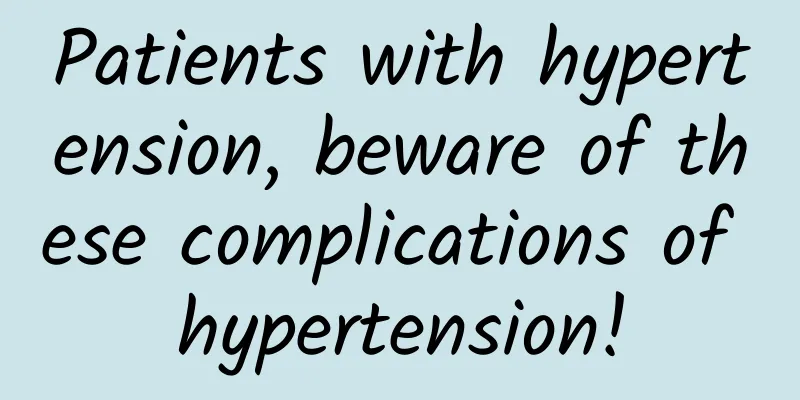Patients with hypertension, beware of these complications of hypertension!

|
The harm of high blood pressure is very great. I am afraid that many people do not know that the biggest harm of high blood pressure is not the increase in blood pressure, but the decrease in body immunity. Therefore, in daily life, to prevent high blood pressure, you must keep your body and mind happy. So, in clinical practice, what are the complications of high blood pressure? Categories 1. Heart complications such as left ventricular hypertrophy, angina pectoris, myocardial infarction, and heart failure 2. Stroke such as hemorrhagic stroke, ischemic stroke, hypertensive encephalopathy 3. Arteries such as arteriosclerosis and aortic dissection 4. Hypertensive renal damage such as slowly progressive arterial nephrosclerosis, malignant arterial nephrosclerosis, and chronic renal failure 5. Fundus such as retinal artery sclerosis and fundus changes Slowly progressive small-artery nephrosclerosis refers to benign hypertension lasting 5-10 years, which begins with lesions in the small renal arteries, followed by renal parenchymal damage; malignant small-artery nephrosclerosis refers to renal damage caused by malignant hypertension, including lesions in the small renal arteries and renal parenchymal damage. Symptomatic care for complications of hypertension 1. Severe headache accompanied by nausea and vomiting is a symptom of sudden increase in blood pressure or hypertensive encephalopathy. The patient should be allowed to rest in bed immediately, and changes in blood pressure, pulse, heart rate, and heart rhythm should be observed. Contact a doctor as soon as possible and take sedative and antihypertensive measures quickly. 2. Dyspnea and cyanosis are often manifestations of left heart failure caused by hypertensive heart disease. Immediately place the patient in a semi-recumbent position and inhale oxygen. The humidifier bottle for oxygen inhalation should be replaced with 20% to 30% ethanol, and cardiotonic drugs should be used according to the doctor's instructions. 3. If there is palpitation, the pulse, heart rate and rhythm changes should be carefully observed and recorded. Comfort the patient, let him/her rest in bed, eliminate tension, and the palpitations will generally be relieved quickly. 4. Edema may occur in late-stage primary hypertension accompanied by heart and kidney failure. During nursing, attention should be paid to strictly record the amount of water intake and output so as to measure the amount for the person. Limit sodium salt in the diet (no more than 3 grams of salt per day), rest in bed, raise the affected limb, and pay attention to protecting the skin to prevent the occurrence of bedsores. 5. Late-stage hypertension can easily cause cerebrovascular accidents, coma and paralysis. For such patients, attention should be paid to safety care to prevent falling out of bed, suffocation, limb burns, etc. If the condition is serious, the patient should be transferred to the hospital for treatment. |
<<: Drinking more water every day actually produced such a miracle!
>>: How to treat phimosis? Treatment of phimosis
Recommend
Does Viagra have any side effects?
What is Viagra? Many people may be unfamiliar wit...
So embarrassing! A man's little hole is inexplicably itchy
Itchy noses happen all the time. Whenever the nos...
Home remedies for prostate problems
The probability of men developing prostatitis is ...
What are the topical medications for premature ejaculation?
Sexual life is crucial to the relationship betwee...
You must know the dangers of acne on the penis!
Many people are confused about acne on the penis....
What is the reason for the recurring red spots on the glans?
Nowadays, more and more male friends are sufferin...
What causes male sexual dysfunction?
Humans are the most advanced animals in the world...
Recurrence of epididymitis
The testicles are a unique male sexual organ. The...
Tips to Delay Ejaculation
For men, being able to last longer in sex will in...
What are the functions of nitrogen pump
People generally don't know much about nitrog...
Understand the psychology of impotence, get rid of inferiority and embarrassment, and move towards a happy sexual life
Work, life, family, illness, living habits, etc.,...
Methods to reduce the incidence of chronic prostatitis
The current society has put more and more pressur...
What to do if a man has chloasma on his face
Maybe many of our male friends often have chloasm...
What are the medicines for treating scrotal eczema?
Scrotal eczema is a common disease among many men...
Why don't I have a morning erection?
In modern society, people are under great pressur...









